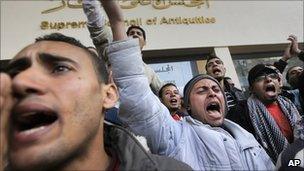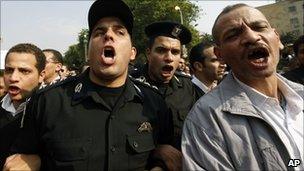Egypt faces bumpy ride towards democracy
- Published

Protests over pay and jobs have continued despite army calls for them to cease
Just take a drive down some of the main avenues in central Cairo and you can see one of the biggest problems facing Egypt's new military administration.
The economy is more or less at a standstill, and so is the civil service.
Outside almost every government building at one time or another in the last few days has been a crowd of disgruntled employees.
Grievances that people were forced to swallow during the repressive Mubarak years are pouring out.
Badly paid rank-and-file staff want more money. Often, they are also burning with resentment about bosses they say have enriched themselves.
The armed forces' fifth communique called for the strikes to stop. If polite requests don't work, the generals will have to decide what they do next.
If they want to keep people on their side, using force to break strikes will not be a good idea.
The biggest and noisiest demonstrations have been by the police outside the interior ministry.
They pushed forward a uniformed sergeant who was obviously unwell, and raged that they were not given proper medical treatment, while the senior officers had their own hospitals.
Messy inheritance
The Egyptians who were in Tahrir Square saw the police as the old regime's brutal enforcers. But the striking policemen claimed that in reality they were also victims.
"They made us confront the people than they left us here and ran away," complained one policeman.

Policemen have joined the protests in Tahrir Square
President Hosni Mubarak left behind a big stack of problems. Some Egyptians doubt whether the military, led by 75-year-old Field Marshal Mohammed Tantawi, is up to dealing with its messy inheritance.
How it tackles the job is going to have a big impact on the way that the new Egypt develops.
Mr Mubarak, it is now clear, was ushered out of the door by the army high command.
But he was overthrown by a popular uprising. The people who took part in it expect Field Marshal Tantawi and his men to bring in the changes that they want.
They applauded when the army dissolved parliament, which was elected in a rigged vote, and when it suspended the constitution, which was designed to make sure that Mr Mubarak or his chosen successor stayed in office.
But the army has been at the centre of power in Egypt since a coup in 1952. The system that has developed since then suits the generals very well. Now they are expected to dismantle it. Power and money are hard things to give up.
The military has promised to introduce civilian rule in six months or when elections come. To get to that point some big challenges have to be mastered.
Egypt needs a new constitution, and a renewed political system. If the protesters are to get their wish for democracy, it needs free and fair elections.
Smart move
For the time being the armed forces are getting the benefit of the doubt from most people. But that will change if Egyptians, who now believe that their opinions matter, decide that the generals are taking them in the wrong direction.
One smart move would be to bring new blood into the cabinet, which is still mainly made up of former Mubarak loyalists, and to allow civilians into Field Marshal Tantawi's top team.
That will stop the idea taking hold that the military wants sole charge of the levers of power. And it could also create a sense that Egyptians are in this together, which might even persuade people to go back to work.
It might also be a useful idea to make moves to seize some of the money that Hosni Mubarak and his family are alleged to have acquired during his 30-year reign.
So far some of his associates have been targeted, but not the family itself. Could an intact fortune have been part of the former president's severance terms?
That won't please strikers who think that their time has come.